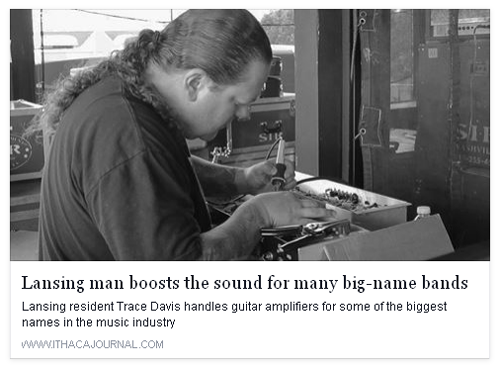Last week Trace Davis took part in a local interview with Correspondent Matthew Montague that was recently released in the 'Ithaca Journal.' - Click on the pic to check it out!

Out back of the Verizon building, near the town garage in an unimpressive steel building, Trace Davis builds, modifies and repairs guitar amplifiers for many of the top artists throughout the world.
He does work for Joe Perry and Brad Whitford of Aerosmith, Billy Gibbons of ZZ Top, Guns N' Roses, Def Leppard, Keith Urban, Alice In Chains, Alter Bridge, Bon Jovi, Five Finger Death Punch, Styx, Joe Bonamassa, Thin Lizzy, Steve Miller Band, Foreigner, Bush, Creed, Alice Cooper, Queenscryche, Kings X, Bob Seger, Moe, Gretchen Wilson, Journey, Whitesnake, Three Days Grace, Smashing Pumpkins, The Spin Doctors, Widespread Panic, and that's just half of the list.
Each amp is different.
"It's like making a red sauce," Davis said. "You could take ten chefs, each with the same recipe and ingredients, and each sauce would come out differently. In its most basic form an amplifier is just a set of transformers, tubes, capacitors, resisters and voltages, and there are countless ways to combine them. And you can take ten capacitors of the same value and rating from ten manufacturers, and they all sound as well as feel different."
Davis starts with the player.
"I go out with them and I talk to them and watch them play. I watch their hands as they play, as that tells me volumes. What is the context of their playing? Are they country, jazz, pop, rock or metal? Is this amp being used for playing live or in a recording studio? I want to make the amp sound good and feel good for the way they play."
Davis draws on his years of playing in bands, as well as being a session guitarist, recording engineer, live 'front-of-house' and monitor sound engineer to be able to speak the musicians' language.
It's important that the amp sounds and feels right to the player, but it also has to sound good in context with the band. He also has the benefit of growing up with a dad, Gary Davis, who oversaw the production of Westinghouse's vacuum tubes and who also loved rock and roll.
"My dad was always listening to Deep Purple, Led Zeppelin, ZZ Top, The Who — all those classic rock bands of the '60s and the '70s," Davis said. "Music was the background to everything we did, and that helped to shape how I hear and perceive guitar tone today."
Shortly after graduating from high school in Bath, Davis went on the road as a "hired gun" and later to New York City with his own band, As It Is.
"I was planning to move to NYC to open an amp shop, but as I was working with Alex Perialas at Pyramid Recording Studios I decided to make Ithaca my home, and I've been here ever since," he said.
He also did sound and monitors at The Haunt, first on Green Street and then moved over to booking the bands when The Haunt moved to its new location on Willow Avenue.
Davis has never been formally trained in electronics or acoustics.
Everything he knows comes from what he learned from his father, as well as tearing down electronics and speakers to learn how they work and why they sounded the way they did. He kept track of what he learned in piles of notebooks. He officially launched Voodoo Amps in 1998, and by 2003 he was busy enough to go full-time.
Today, Voodoo has four technicians and an administrator and is the largest tube amp modification company in the world with a satellite shop in the United Kingdom. More than 450 amplifiers leave the shop each year — modified, repaired or new-built. The company is building a line of amps for non-rock hero consumers. Davis also spends a lot of time on the road, working with clients who are always looking to improve the way they sound.
"I have tours scheduled through September right now," Davis said.
He spent a recent weekend with the band Bush, talking about customizing amps for guitarist Chris Traynor and making sure that the gear they have now is absolutely reliable in constantly changing conditions and an environment where there is little margin for error.
"While working for the headliners, I have also ended up working with the opening acts, too," Davis said. "They say, 'Hey, can you take a look at this for me?' and I have a new client."
Most of the time, Davis spends the show backstage "to save his ears." But sometimes he will go out front to watch the guys he grew up listening to play through his amps to a sold out show.
"For me it's like coming full circle from when I was a kid listening to music and now working closely with the many of the same players," he said. "It's truly an honor for me."
[more]